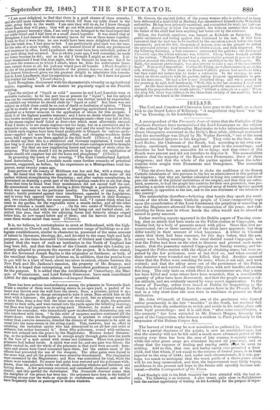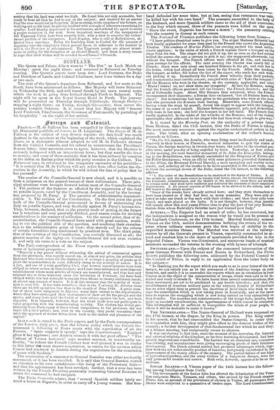IRELAND.
The Earl and Countess of Clarendon have gone to the South, on a short visit to the famed Lakes of Killarney. "A magnificent stag-hunt" was "to be "on Thursday, in his Lordship's honour.
A correspondent of the Freeman's Journal states that the Catholics of the Northern Province have memorialized the Lord-Lieutenant on the subject of the refusal by the Castlewellan Magistrates to take informations against divers Orangemen concerned in the Dolly's Brae affair, although instructed that the asssemblage was illegal by Mr. Walter Berwick, " one of the most eminent criminal lawyers in this kingdom." They refer to the facts, that Lord Roden, the Chairman of the Bench, had, according to his own con- fession, sanctioned, encouraged, and taken part in the assemblage; and therefore he had become amenable for so doing; and that others of the Bench were present and did not interfere to disperse it. The memorialists observe that the majority of the Bench were Protestants, three of them clergymen; and that the whole of the parties against whom the infor- mations were sought were Protestants and Orangemen. The memorial declares-
" That the above facts are calculated to shake the confidence of the Roman Catholic inhabitants of this province in the law as administered in this portion of the kingdom; that they are further calculated to bring into contempt and disre- pute the whole of the judicial institutions of the empire; and that they are calcu- lated, moreover, to lead the people into societies for their own protection, thus per- petuating a system which results in the periodical array of hostile factions against one another, in opposition to the law, and to the sore detriment of the interests of this country." The memorialists therefore—believing that herein they speak the senti- ments of the whole Roman Catholic people of Ulster—respectfully urge upon the consideration of the Lord-Lieutenant the propriety of removing at once the Magistrates aforesaid from the commission of the peace, and sub- stituting for them men in whose hands the office would not he abused or turned to party account.
Rather startling reports appeared in the Dublin papers of Tuesday even- ing, that an attack had been made on the Police-station at Cappoquin, on Sunday last, by a body of peasants armed with pikes. Since that first an- nouncement, two or three narratives of the affair have appeared ; but they differ totally in their account of what happened. A writer in Clonmel states that there had been rumours, for two days before, that the pea- santry were holding meetings in the rural district round Cappoquin, and that the Police had been on the alert to discover and prevent such move- ments; that the peasantry entered Cappoquin on Sunday evening, and be- leagured the Police-station with the object of obtaining arms; but were re- pulsed by the few policemen, were at last fired on, and when several of their number were wounded and one killed, they fled. Another account states that the Police were searching for arms, where is not said, and were resisted; and that the affray arose out of the persistence of the Police, who discovered and carried off some fifty pikes, with new handles about ten feet long. The only facts on which there is a concurrence are, that a man has been killed and some others have been wounded; that a considerable quantity of pikes have been discovered; and that the people assume a sul- len attitude, and are evidently moved by some secret organization. In the coarse of Tuesday, orders were issued at Dublin for despatching to the South a body of Constabulary from the reserve force in the Pl,cenix Park; and in a very short time the men were in readiness to proceed on their destination.
Mr. John O'Connell, of Limerick, one of the gentlemen who figured rather prominently in the late " troubles" in the South, has received full permission from the authorities to revisit and reside in his native place safe from legal proceedings: and it is said that, " after some consideration, a like amnesty" has been extended to Mr. Francis Morgan, formerly law agent of the Corporation, who became a resident in Paris previously to the suspension of the Habeas Corpus Act.
The harvest of 1849 may be now considered as gathered in. That there will be a partial shortness of the potato, is now an established fact; but that the scarcity will not be felt until a much more advanced period of the ensuing year than has been the ease of late seasons, is equally certain; while the other green crops are abundant beyond all precedent, and so cheap that the expense of feeding and rearing cattle nlikst be next to nothing. Add to this, that oats and barley rarely ever promised a finer yield, and that wheat, if not equal to the returns of former years, is at least superior to the crop of 1848; and, under such circumstances, it is not, per- haps, too much to anticipate that the worst perils of a three-years crisis will be ere long surmounted, and that, the improvement once fairly begun, confidence in the present and hope in the future will speedily become uni- versaL—Dahlin Correspondent of the Times.
Lord Stanley's visit to his Irish tenantry has been attended with the best re- sults. The following is an instance. A poor tenant quite close to Ballykisteen took the earliest opportunity of waiting on his Lordship for the purpose of repro- seating that his land was rated too high. He found him not only accessible, but ready to hear all that he had to say on the subject; and received for an answer that the case would not be forgotten. Next morning, to the surprise of the farmer, on walking out on his land, he met his landlord with a couple of labourers examining its quality. Lord Stanley acquiesced in his sentiments, and ordered his agent to make a proper reduction in the rent. Some important meetings of the ratepayers of the Tipperary Union have been recently held, with a view to consider the embar- rassed position of the ratepayers. Lord Stanley, who is still at Ballykisteen, at- tended these meetings. Today his Lordship went to Cashel for the purpose of inquiring into the complaints which prevail there, in reference to the manner in which the Poor-law is administered. The Tipperary people are almost unani- mous in calling for the formation of an elected Board; and there is every reason to hope that their wishes will be acceded to.—Cktanzel Chronicle.



























 Previous page
Previous page